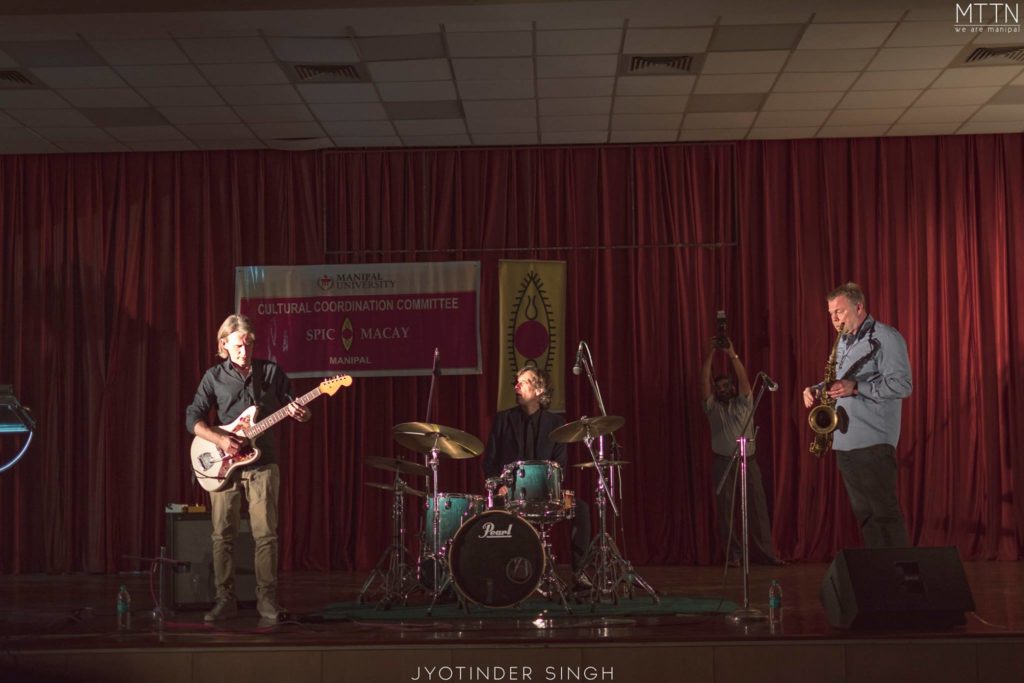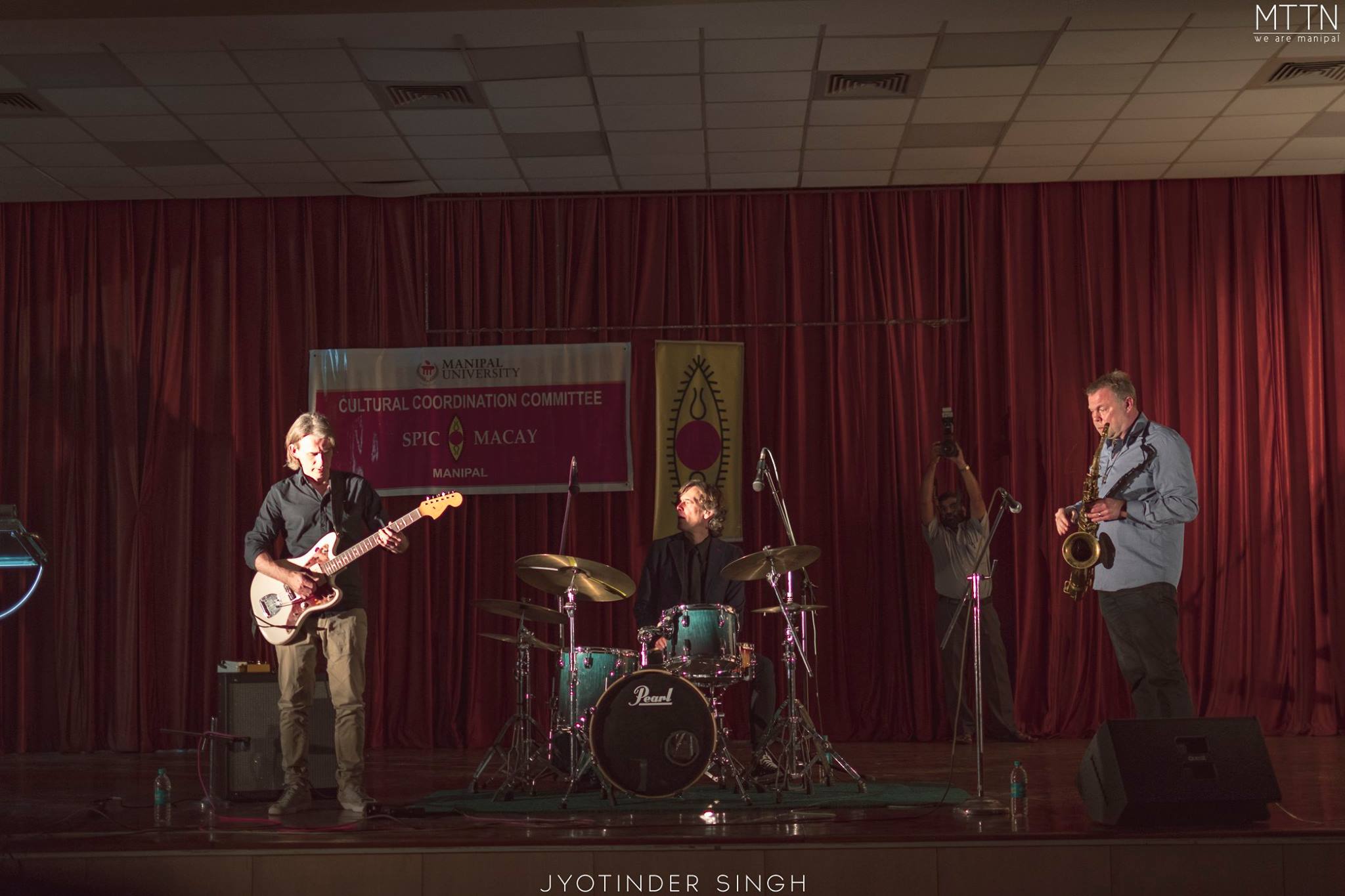
The evening of 9th January, 2018 turned out to be an absolute delight for the jazz aficionados in Manipal as we welcomed the world-famous band, “Jazz Explorer Trio” amidst us. The trio consisted of the Danish saxophonist Lars Moller, guitarist Thor Madsen, and drummer Jonas Johansen.
Hosted by the Cultural Coordination Committee of MAHE, in association with SPIC MACAY, the event saw the trio perform in the MIT Library auditorium for more than an hour, producing beautiful music ranging from typical jazz to that inspired from Indian classical music.
The crowd was blessed to witness short solos from the artists as well, which succeeded in creating an atmosphere of both, emotion and power with their enthralling details.
The much-admired trio engaged with us in a brief interview to talk to us about what Jazz means to them, and how it became a part of their lives.
MTTN: When I say the word “Jazz”, what is the first thing that comes to your mind?
LARS: Well, for me jazz is a global art-form that has a particular quality of being inclusive. It has a history of over a hundred years. Basically, jazz is a mixture of elements which keeps adding newer elements as it evolves. You could say that jazz has, at several times, adopted influences from Indian classical music.
MTTN: Could you describe this Eastern influence a little more?
LARS: Yes. The reason for jazz being particularly suited to get influenced from Indian classical music is that there are a whole lot of similarities between the two. First of all, jazz is a type of music that requires a lot of improvisation, instrumental virtuosity and control. It is a language based on reflection and development. The idea of having a heritage and building on it is part of the jazz tradition as well as the Indian tradition.
MTTN: Talking about heritage and influences, we’d like to know what your influences are. What subjected you to jazz in the first places?
LARS: That’s a funny story. I got into playing the saxophone mainly because of this poster I saw back in high school. It had a picture of a saxophone on it. And I thought it looked cool and I realised that the saxophone really fit into jazz. And then I started getting interested in jazz.
MTTN: Was that back in Denmark?
LARS: Yes. It was in Denmark. And then my particular interest in Indian classical music developed later. It was after I got my “jazz license” after living in New York for a few years, playing with some good musicians, recording and stuff like that. Then I came across Indian classical music and was particularly attracted to the idea that in Indian classical music, they had the same kind of philosophical approach of capturing emotions and harmony as in jazz.
MTTN: It is a well-known fact that jazz has been one of the genres which has influenced modern music to a large extent. Can it be said that jazz is analogous to a father figure to contemporary music?
LARS: The thing you must understand is that jazz is a genre of music that came about around the same time as the first worldwide media came about which was the gramophone and the radio. So, jazz was exposed worldwide through the media and thereby influenced all music from that era onward.
MTTN: Were there any personalities in jazz that you would idolise in your early days as a jazz player? Was it Dave Brubeck or Buddy Rich or someone like that?
LARS: I was particularly motivated by a jazz player named John Coltrane who was also a sax player who strongly adopted Indian classical music.
MTTN: To a lay-person who has never listened to any jazz before, what would you recommend they start with? Is there any sub-genre you would suggest?
LARS: There isn’t any particular genre I would recommend, as such. What I would suggest is that they have an open attitude towards jazz. Jazz, when it’s good, has a particular ability to express NOW. You leave everything to the moment. And you can have that moment where you have completely lost yourself to the harmony and the music lets you transcend reality and take you to a whole new level.
MTTN: Personally, I love listening to jazz when I am heightened emotions. Joy, or sadness, or fear. Is it the same for you as well?
LARS: Well. There is no right way to answer a question like that. I mean, jazz originally started out as a dance music and a whole lot of stuff was added to it later on as well. What it really boils down to is that jazz has a wide variety of sub genres and each person has their own individual preference.
MTTN: I’m pretty sure you must have heard of the movie Whiplash. What do you think about it?
THOR: Yes. I chose not to watch it. The reason I didn’t watch it is that; what they depict, like a person just crazily practicing and working hard to achieve what he aspires to be – that doesn’t happen in real life. There is a lot more that goes into being a man of music. Practice alone does not cut it.
MTTN: What about the movie La La Land? What are your views?
JONAS: I heard a lot about the movie. But then again, as Thor said, it glorifies the whole journey of being a performer.
THOR: To be completely honest, I get a little annoyed by musicals. I grew up watching musicals and if there was a song in the first 15 minutes of the movie, I knew it was going to be a musical. I’m not too fond of any of it.
MTTN: What are your fondest musical memories, whether in an impromptu jamming session or at a live show?
THOR: I remember this one concert we had in Benares. It was a sunrise concert, so it was quite early in the morning. The concert may not have been the best concert as far as music is concerned, but that day we could truly feel the music connecting with us, with the audience and the environment around us. It was a really emotional concert for all of us and we really liked it.
MTTN: How would you identify your style of playing as?
JONAS: When I play at a concert and listen to it as I play, there is this moment when I feel “Ooh maybe he’s right”. The music itself tells me where to go and then I do relax, which happens occasionally. And then I let the music tell me where to go. I don’t really have control over it – it just happens. Then when other people comment on that, I realise what the goal was. And then I collect these goals and make sure to leave space for stuff like that to happen again. That is how I think I can define my style.
– As told to Tushar Machavolu and Agnihotra Bhattacharya for MTTN

Leave a Reply
You must be logged in to post a comment.